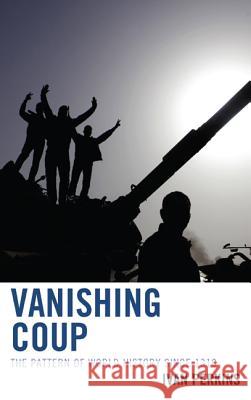Vanishing Coup: The Pattern of World History Since 1310 » książka
Vanishing Coup: The Pattern of World History Since 1310
ISBN-13: 9781442222717 / Angielski / Twarda / 2013 / 374 str.
How did the Republic of Venice go 486 years without a single coup d'etat or coup attempt? Is it the same force that has generated stability in Britain since 1746, in the United States since 1776, and in a growing number of nations around the world? This thoughtful and engaging book offers the first extended analysis of coups, which have played a central role in world history and politics. Ivan Perkins draws on his extensive research on the history and inner workings of coups to explain how a small but growing number of nations have escaped chronic violence and built states with perpetually peaceful transfers of power. Readers will explore the rising coup-free zone, from the baroque system behind 486 years of stability in Venice to today's heavy-handed but efficient regime in Singapore. Along the way, the author recounts some of history's most gripping political intrigues: the spontaneous street uprising against King Tarquinius Superbus in Rome, the machinations of Bengali officials that launched the British Empire, and the fears that compelled General Pinochet to join a coup and become dictator of Chile. Perkins examines in detail the first three coup-free states. He argues against the standard theory of stability, which holds that professional military officers are so thoroughly trained in ethics and civilian control that leading a coup would be unthinkable. Instead, he proposes a new and simpler interpretation: stability is founded not on ethics but on law. An impartial rule of law weakens personal loyalty relationships, especially within the political-military establishment, and inhibits grand criminal conspiracies. The book concludes with a new explanation for the "democratic peace" and shows why coup-free states form enduring alliances.











